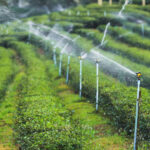Maintaining a weed-free farm is not just about aesthetics; it’s a crucial aspect of ensuring the health and productivity of your crops. Weeds can compete with cultivated plants for nutrients, water, and sunlight, stunting their growth and compromising yields. Fortunately, employing effective techniques can help keep your farm free of weeds and promote a thriving agricultural environment.
One fundamental technique is practicing regular and timely cultivation. By cultivating the soil, you disrupt the growth of weeds and prevent them from establishing a strong root system. This age-old method not only controls existing weeds but also disrupts the germination of weed seeds, acting as a proactive measure against potential infestations.
Cover crops are another powerful ally in the battle against weeds. Planting cover crops that provide dense ground cover helps smother weeds, preventing them from taking root and gaining a foothold in your fields. Additionally, cover crops contribute to soil health, enriching it with organic matter and reducing the likelihood of weed growth.
Mulching stands out as a versatile and effective weed control technique. Applying a layer of organic or synthetic mulch around your crops acts as a physical barrier, inhibiting weed germination and growth. Organic mulches, such as straw or wood chips, not only suppress weeds but also contribute to soil moisture retention and temperature regulation.
Embracing the power of competition is a strategy rooted in nature. Companion planting involves strategically placing crops that naturally deter weeds alongside those that are susceptible. This symbiotic relationship not only helps control weed growth but also enhances the overall resilience of your crops by encouraging biodiversity.
Precision cultivation, utilizing tools such as rotary hoes or flame weeders, allows farmers to target specific areas and control weeds without disturbing the entire soil surface. This approach minimizes soil disruption, preserves beneficial microorganisms, and provides an effective solution for weed management in row crops or precision farming systems.
Incorporating herbicides into your weed control strategy requires careful consideration. While chemical solutions can be effective, they should be used judiciously and in accordance with recommended guidelines. Selective herbicides that target specific weed types can be advantageous, minimizing the impact on non-target plants and the overall ecosystem.
Implementing a robust integrated weed management (IWM) plan is essential for sustainable weed control. IWM combines multiple strategies, such as crop rotation, diverse planting patterns, and targeted herbicide use, to create a comprehensive approach that reduces the reliance on any single method. This holistic strategy promotes long-term weed management success.
Finally, regular monitoring and early intervention play a pivotal role in weed control. Regularly inspecting your fields allows you to identify weed issues early on, enabling prompt and targeted action. Whether through manual removal, cultivation, or other methods, addressing weed problems in their infancy prevents them from becoming overwhelming challenges.
In the intricate dance of farming, weed control is a choreography that requires a combination of techniques. By incorporating these effective methods into your farming practices, you not only keep your farm free of weeds but also nurture an environment where your crops can flourish. A weed-free farm is not just a visual delight; it’s a testament to your commitment to sustainable and productive agriculture.







